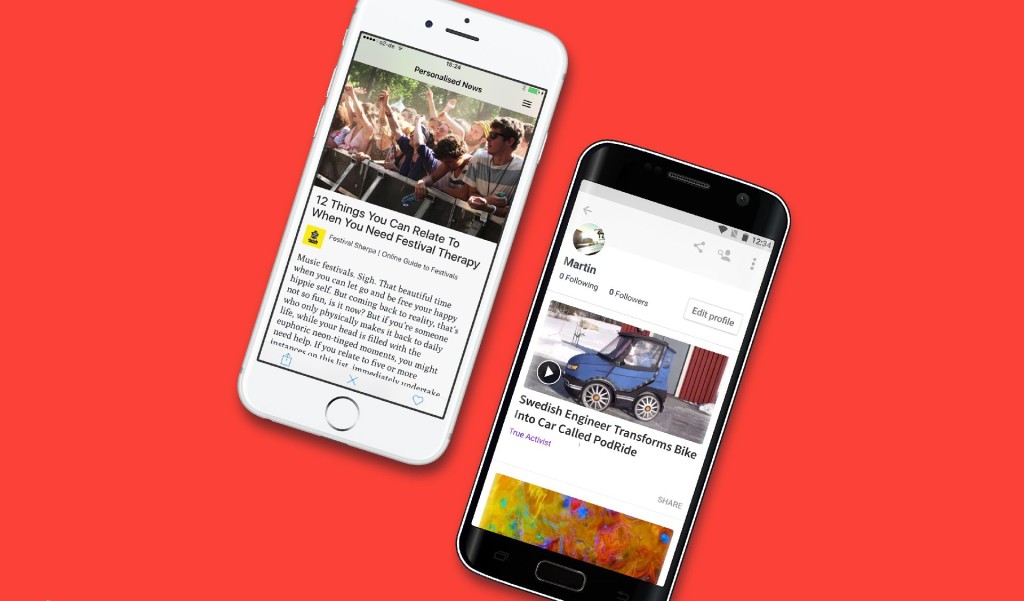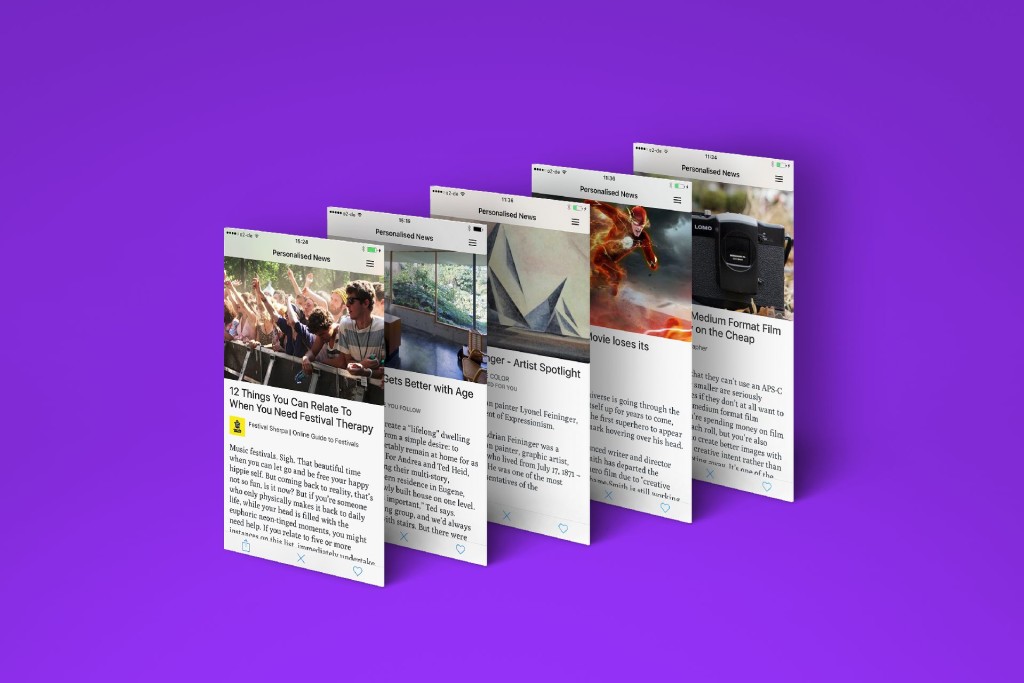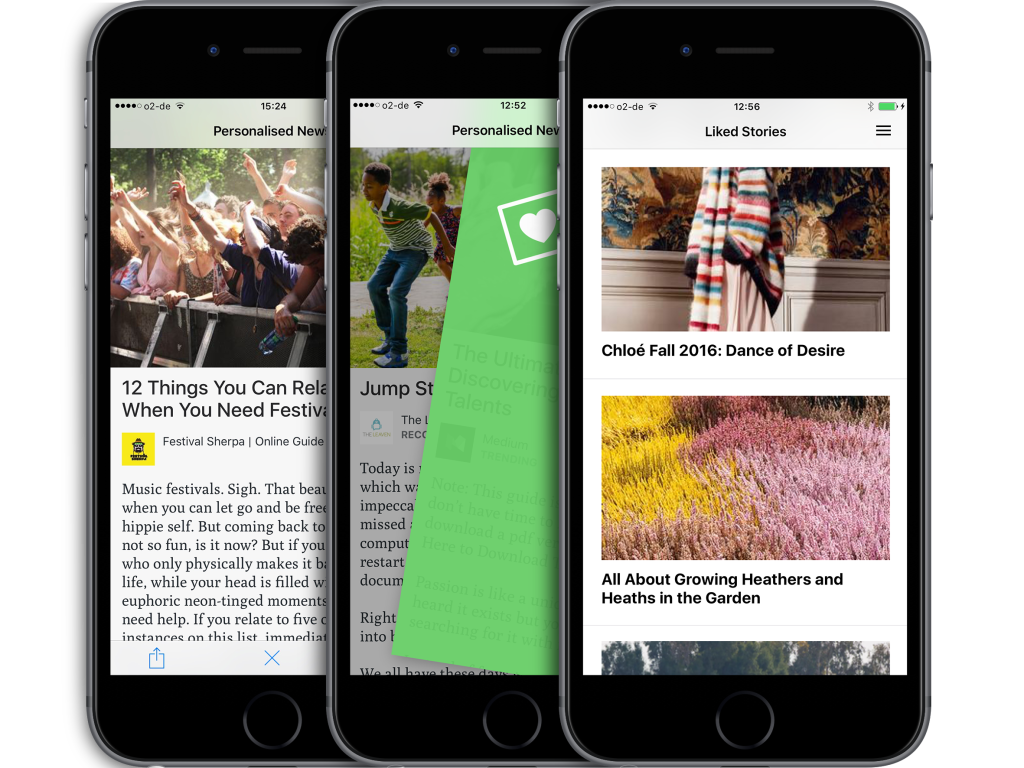At the same time that Yahoo is up for sale, and huge media companies are struggling to generate ad revenue from an audience uninterested in advertising, a small startup in London hopes to solve the issue of content aggregation. After all, there has never been more articles written on a daily basis about any topic that might interest you. But there’s also a tremendous amount of clutter and noise (especially through social media channels) that gets in the way when trying to find those stories.
Felix Miller and Martin Stiksel, two of the founders of data-driven music curation company Last.fm, have launched Lumi News. The free app launched today for iOS and Android devices, although a beta version of the Android app has been in testing for the past year with 120,000 users.
Although the app looks extremely simple, there’s a lot of technology behind it. Lumi has three data scientists in its office. And the technology is using search result optimization, retargeting, and click stream analysis to benefit and analyze a user’s interests. Much of this technology has previously been used to target advertising to users online.

Lumi News selects the top 100,000 articles every day from a social media feed of over 200 million articles. In addition to tapping into the social media feeds of its users, the app quickly ascertains the user’s personal interest by the swipe of a finger.
Miller and Stiksel officially retired from the tech space back in 2009, in part because they had sold Last.fm to CBS for $289 million in 2007. But ever the entrepreneurs, the partners re-entered the space in 2011.
“We started talking about browsing history, Miller said. “We dreamed of this search engine portal all based on the browsing history of things you liked. We spent two years of research on this, and at the same time refreshed ourselves on new data science technology. We learned a lot, and tried and failed a lot of times.”
Ultimately, the duo realized that the biggest need out there would be for people reading content. Specifically, connecting the right users to the right articles, which is what all the tech giants have been chasing.
“Twitter, Flipboard, and Facebook were all failing because they weren’t making it easier to find content,” Stiksel said. “We set out to bring our technology mainstream, so my Mom can be an online expert. She can read all the right bits from all the publishers and user-generated bloggers that gets produced and appears as noise online.”
Lumi News feeds whole articles to your device, and the user simply swipes right to read it or left to skip it. Another story is always right behind it for you to read. Within a matter of minutes, the data science kicks in, and relevant content procured from over 40,000 outlets of all sizes, is delivered to your smartphone or tablet.
“We see you spending time reading an article and it goes into a list,” Stiksel said. “The swipe action learns from that, so the next story will appear just behind it. The difference with our app is like a restaurant that’s new to you and you don’t know what you want, versus a local restaurant where they know your order when you walk in.”
Of the 120,000 beta downloads, Lumi built up 50,000 active monthly users. Miller said the content they were interested in had a technology slant, but the app already covered a breadth of topics from health to sustainability to music articles. As the app scales up with users, so will the variety of content.
Last.fm grew to 50 million unique tracks with metadata based on the listening histories of 40 million people. Stiksel said that technology auto-fingerprinted everything, creating a giant catalog and the most comprehensive relationships on top of that. The data science analyzed what was similar with every single track.
“People would expand their horizon very quickly within this ecosystem,” Stiksel said. “We expect the same to happen with Lumi News.”

The new app was built with more advanced data science than Last.fm, as technology is always evolving. Every article that enters the app is its own entity. Miller said if a story is great, it gets pushed to the right eyeballs. But it needs to cross that initial social media threshold to enter, although users can also select any story and enter it manually into the app.
“You have all these words in certain combinations that mean a certain thing,” Stiksel said. “The system is clever enough so that in news and articles, a word like ‘Donald Trump’ could be viewed as positive or negative by individual users. If it’s a negative association, all stories about that word will be deleted from your recommended feed.”
If the app can reach critical mass with millions of active users, the Lumi founders believe it could help media companies. The startup has already begun showing its early results to some publishers. The app pulls directly from websites and blogs, complete with advertising, delivering those sites the traffic.
“If your whole company culture is about produce content, we’re here to make it easy to find the right stuff,” Miller said. “We only ever work with articles already published. We navigate the entire space and boil it down to one specific user. Our belief is everybody who has smartphone technology should be able to tap into this.”
The Lumi founders believe the smartphone will remain the where news article consumption is going to happen primarily for the foreseeable future.
“There are over 3 billion smartphones worldwide and the news business isn’t getting healthier,” Stiksel said. “Publishers are struggling, but the problem is in getting the content to the right audience. Home pages aren’t working, and social networks have too much going on and not enough coherence.”
Ultimately, Miller said Lumi News was built as a surefire way to deliver only satisfying articles to the right people.
“This is a hot space right now because of Apple News and Facebook Instant Articles, but the results are still the same in that they don’t solve discoverability,” Stiksel said. “We’re about getting into the user’s headspace and giving them something to read right away.”

